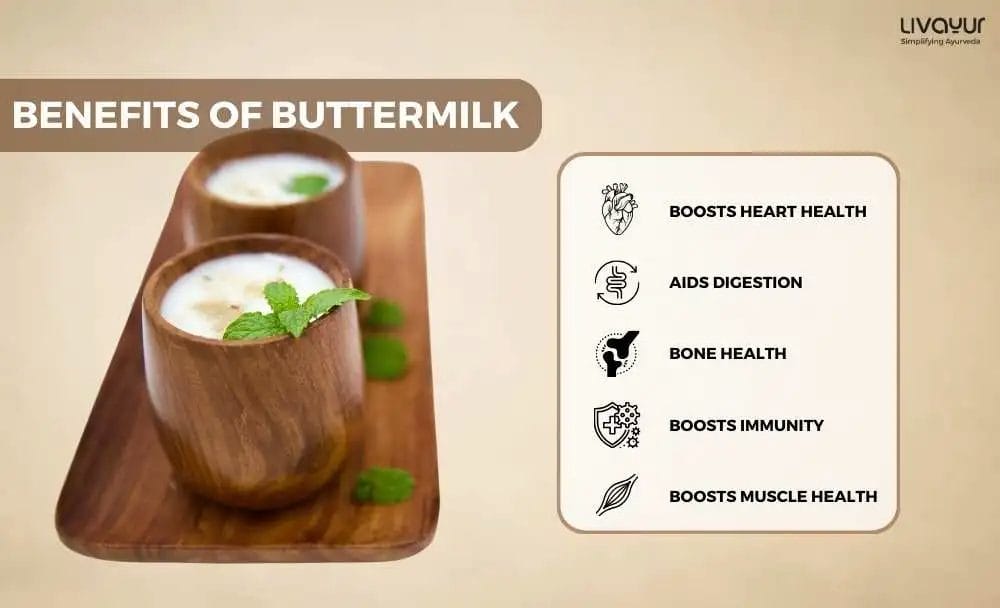
Buttermilk or Takara is a popular Indian beverage served throughout the country. It is one of the most important beverages mentioned in Ayurveda, holding significant medicinal value. On a scorching summer day, a tumbler full of buttermilk can immediately bring you back on track after all the exhaustion, fatigue, and perspiration.
Let’s explore more about buttermilk, its nutritional value, and the buttermilk benefits in this article.
Buttermilk or Takara As Mentioned in Ayurveda
Takara, also known as buttermilk, is a traditional beverage that holds significant importance in Ayurveda as both a dietary staple and a medicinal remedy.
Ayurvedic principles emphasize the consumption of buttermilk as part of a balanced diet, considering it a wholesome food that promotes overall health. Buttermilk is also often referred to as an elixir (Param-Amrutam) as it keeps old age (Jara) and diseases (Vyadhi) at bay. [2]
Although buttermilk nowadays encompasses a range of dairy drinks, originally, it was the residual liquid left after churning butter from cream.
Nutritional Value of Buttermilk or Takara
Buttermilk is not only refreshing but also a nutritious beverage. In comparison to a cup of whole milk, which has higher calories and fat, a cup of buttermilk provides a lighter option. The benefits of drinking buttermilk come from the vast assortment of buttermilk nutrients. The table below shows the various nutrients in 1 cup of buttermilk and their value:
| Nutrients | Value |
| Calories | 98 Kcal |
| Fat | 3 grams |
| Carbohydrates | 12 grams |
| Proteins | 8 grams |
| Riboflavin | 29% of the daily value |
| Sodium | 16% of the daily value |
| Calcium | 22% of the daily value |
| Pantothenic acid | 13% of the daily value |
| Vitamin B12 | 22% of the daily value |
Buttermilk health benefits
1. Supports Digestive Health [1]
Primary Benefits: Buttermilk helps soothe the stomach after consuming spicy food. When added with spices like ginger, black pepper, and cumin powder, it also helps relieve stomach irritation and expel gas.
Secondary Benefits: Additionally, buttermilk is also known to treat and prevent several gastrointestinal problems like irregular bowel movements, irritable bowel syndrome, colon cancer, and stomach infections.
2. Reverses Dehydration [2]
Primary Benefits: Buttermilk is known as an effective therapy to prevent dehydration. In buttermilk, the water content is more than 90%. Rich in electrolytes, it fights against heat and loss of water from the body.
Secondary Benefits: Consequently, it also provides relief from summer-related issues like prickly heat and general uneasiness.
3. Improves Bone Health [2]
Primary Benefits: Buttermilk is rich in calcium and provides an excellent natural way to consume calcium without fat. Even lactose-intolerant people can take buttermilk for their calcium needs.
Secondary Benefits: Due to its high calcium content, buttermilk helps support cell communication and muscle contraction and prevents bone disorders like osteoporosis.
4. Strengthens Immune System [2]
Primary Benefits: Rich in B complex vitamins and vitamin D, buttermilk helps strengthen the immune system and lower the risk of infections.
Secondary Benefits: Additionally, it also helps overcome weakness and anemia caused by vitamin insufficiency.
5. Boosts Heart Health [1]
Primary Benefits: Buttermilk is a natural remedy for lowering and controlling blood cholesterol.
Secondary Benefits: In addition, it is also known to manage blood pressure levels, further boosting heart health.
6. Prevents Formation of Ulcers [2]
Primary Benefits: Buttermilk helps to neutralize stomach acids, prevent heartburn, and protect against ulcers. It also prevents ulcers from erupting again.
Secondary Benefits: As a result, it can help people with GERD or gastroesophageal reflux disease.
7. Builds Muscle Health [2]
Primary Benefits: Buttermilk increases protein intake, which is essential for building muscles.
Secondary Benefits: Consequently, it supports tissue repair, maintenance, and overall body health.
How To Make Buttermilk or Takara at Home?
- Take a bowl and add plain yogurt to it.
- Whisk the yogurt with a spoon or Mathani (traditional wooden churner) until it becomes smooth and creamy.
- Slowly add water to the yogurt while continuously whisking it, until the yogurt and water are well combined.
- Add salt to taste. You can also add spices like roasted cumin powder, black salt, ginger powder, or chaat masala to give the buttermilk additional flavor.
- Mix everything well and serve.
Buttermilk Preparation for Specific Health Issues
Ayurveda recommends adding specific spices to buttermilk or Takara to alleviate specific disorders or pacify specific Doshas. Some of these recommendations include:
- If you have Vata disorders, add rock salt to your buttermilk.
- In the case of Pitta disorders, combine buttermilk with sugar.
- People with Kapha disorders should mix Takara with Trikatu (black pepper, long pepper, and dry ginger).
- If you have malabsorption syndrome, hemorrhoids, or diarrhea, mix buttermilk with Hing or asafoetida, cumin seeds, and rock salt. [2]
How to consume buttermilk? [3]
1. As a spicy beverage
A glass of buttermilk spiced up with black pepper powder, roasted jeera powder, crushed mint leaves or coriander leaves add salt to taste makes the perfect refreshing drink to balance the electrolytes on a hot summer day. Also, this drink can neutralize the acids in your stomach, in case you’re suffering from acidity.
2. As a marinating agent for your meats
Simply switch from vinegar to buttermilk while marinating the meats. Buttermilk can do wonders, making your meats soft and succulent. The calcium in buttermilk can help in the breakdown of proteins, making the meat soft and tender.
3. Do some baking with buttermilk
If you are planning to bake bread or a cake, add buttermilk to the batter. Lactic acid in buttermilk can activate the baking soda making your cake extremely fluffy and spongy.
4. Cook up a breakfast
Adding buttermilk to your Dosa batter or the batter of the Besan Cheela will not only make these breakfast food items super fluffy but also super tasty!
5. Add to salad dressings
Adding buttermilk to salad dressings can make your salads taste great.
Precautions to keep in mind
Though Ayurveda considers buttermilk to be an elixir, some precautions need to be considered. The major precautions are listed below:
1. Can be high in sodium
There is a possibility of buttermilk to be high in sodium. No diet high in sodium should be avoided by people with high blood pressure as it may damage the blood vessels by causing a rise in blood pressure.
2. May prove problematic for people with lactose intolerance
People with lactose intolerance can find buttermilk to be easily digestible. But in rare cases, buttermilk too may give them trouble.
3. Need to avoid under certain conditions
In the classical texts of Ayurveda, it has been advised that one should avoid buttermilk following health issues like rheumatic fever, asthma, severe constipation, and exposure to heat. [3]
FAQs
1. Is buttermilk suitable for people with lactose intolerance?
Yes, buttermilk is often well-tolerated by people with lactose intolerance. During the fermentation process, lactose in milk is converted into lactic acid, making it easier to digest for those who are lactose intolerant. However, it’s advisable to listen to your body and consult with a healthcare professional if you have any concerns.
2. Can you drink buttermilk if you are on a low-calorie or weight-loss diet?
Yes, buttermilk can be a part of a low-calorie or weight-loss diet as it is relatively low in calories compared to whole milk. However, it’s important to consider the overall calorie intake and nutritional balance of your diet. Moderation is key, and it’s recommended to consult with a nutritionist or dietitian for personalized advice.
3. Does buttermilk have probiotic benefits?
Yes, buttermilk can have probiotic benefits. However, not all commercially available buttermilk may contain live cultures. So, it’s recommended to check the label or consider making homemade buttermilk for optimal probiotic benefits.
4. What are the Ayurvedic properties of buttermilk? [3]
The Ayurvedic properties of buttermilk are as follows:
• Rasa (Taste): Sweet, sour & astringent
• Guna (Quality): Dry, light & binding
• Vipaka (Post-digestive effect): Sweet
• Virya (Potency): Hot
5. What are the different names of buttermilk in other local languages? [3]
Buttermilk is known by several other names in local languages. Read below:
• Chhaachh in Hindi
• Ghol in Rajasthani
• Moru in Malayalam & Tamil
Conclusion
Buttermilk or Takara is a lighter alternative to whole milk, providing essential vitamins and minerals like B vitamins, potassium, and calcium. Its consumption aids in digestion, prevents dehydration, supports the immune system, and even boosts heart health. As an elixir, buttermilk also promotes overall health and acts as a preventive measure against age-related ailments and diseases. Incorporate buttermilk into your diet now and experience the benefits of buttermilk for your health.
Disclaimer
This article is written from a health and lifestyle perspective. It is for general information and is not meant to substitute any medical advice. Please consult your doctor for appropriate medical consultation.


















